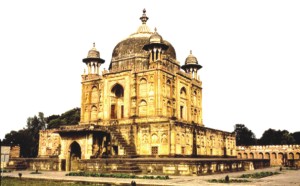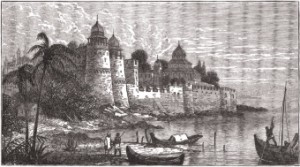|
Flashback
Under the Same Sky (Part-III)
Bad Days and Good Doctors
Perveen Ahmad
 It was a rain-drenched, monsoon morning on 23 July 1937. The midwife had stayed with my mother overnight and around 4 am I emerged with the usual shrieks when held upside down by the Dai. My mother, I am told, smiled faintly and said to my father, "She is a Leo. She'll match up to you." The reason for the comment, I came to understand much later, was that my father was a domineering person. As time went on I also realised that his temper was not always without purpose, but rather to reach a goal he had set. Those around him had to follow what he said because he thought it was good for them. My brother, Zamir, was one month short of two years and my elder sister Nasima was three years old. Their pet names were Baba and Cuckoo. In the family album was a photograph of my mother holding my brother in a long white baby gown, with my sister snuggled near her arm, eyes sparkling and beaming a cherubic smile. It was a rain-drenched, monsoon morning on 23 July 1937. The midwife had stayed with my mother overnight and around 4 am I emerged with the usual shrieks when held upside down by the Dai. My mother, I am told, smiled faintly and said to my father, "She is a Leo. She'll match up to you." The reason for the comment, I came to understand much later, was that my father was a domineering person. As time went on I also realised that his temper was not always without purpose, but rather to reach a goal he had set. Those around him had to follow what he said because he thought it was good for them. My brother, Zamir, was one month short of two years and my elder sister Nasima was three years old. Their pet names were Baba and Cuckoo. In the family album was a photograph of my mother holding my brother in a long white baby gown, with my sister snuggled near her arm, eyes sparkling and beaming a cherubic smile.
My mother looked proudly regal with her two offspring, and I often heard her say she loved having children; marriage she mused was just a necessary evil in order to have the blessing of children. She was a stoic Victorian. I did not find any photographs of myself as an infant, in fact not till I was over ten years old. The reason for this, I discovered later was that I was born a weak and sickly baby. Also around this time my father who was in the British India Railway was transferred, moving to his new post and leaving us stationed in Allahabad until accommodation was available. The Dai and neighbours who came to assist my birth were pleased to see the glossy thick hair on my head, my large eyes and pretty lips, but I was a skinny baby girl. In three months time I showed signs of being a rickets-affected child: listlessness with a whining cry and very little appetite. The struggle of my mother and home-visiting doctors over the entire year was an endless round of bone-building medication and oil massages with the simple medication available in those years. Child mortality from rickets was common then along with other killer diseases such as diphtheria, whooping cough, small pox, typhoid and cholera. Carefully measured calcium doses along with fresh milk and special body massages, sun basking and physiotherapy exercises had to be followed. Sheer care and the dauntless will of my mother to get her baby well was probably the reason for my recovery. However, a lot more grim days were in store for me as my wonderful mother nursed me through a serious bout of colic when I was four years old, and meningitis when I was eight.
Those were the days when doctors diagnosed diseases through observation of the patient's symptoms, fever patterns, colour of eyeballs, tongue, skin, pulse rate and breathing conditions. Those were the days of 'mixtures' prepared in chemist shops by compounders. There were castor oil laxatives and herbal balms, there were vinegar in cold water compressions for forehead and temples to reduced fevers. Doctors watched over their patients, sitting out nights, along with parents. The 'beside-manner' of doctors was the psychological boost for parents and patients.
Sulpha drugs had entered the medical arena in the 1940s and did wonders for the sick. Those were the times in which diseases had names, when the doctor checked patients and patients were not sent off for laboratory tests without even talking to them. Doctors listened and did not brush off their patients with vague references to 'viruses.' Doctors diagnosed and informed patients that they had typhoid, or enteric, influenza, pneumonia, cholera and, as in my case, meningitis.
 My mother told me of the despair she felt when she heard this news. It was a killer disease affecting the brain, My head of thick black hair, inherited from my father, had to be shaven off in an effort to reduce the raging fever of 105. Mother and father kept vigil over me for twenty-four hours, placing ice packs and cold vinegar pads to my head. They said I was in a terrible state of delirium for several weeks crying out to eat curd, "Dahi, dahi, dahi". I would mumble incessantly. My mother told me of the despair she felt when she heard this news. It was a killer disease affecting the brain, My head of thick black hair, inherited from my father, had to be shaven off in an effort to reduce the raging fever of 105. Mother and father kept vigil over me for twenty-four hours, placing ice packs and cold vinegar pads to my head. They said I was in a terrible state of delirium for several weeks crying out to eat curd, "Dahi, dahi, dahi". I would mumble incessantly.
I was in hospital for three months and with meticulous doses of drugs and extraordinary nursing I came through. My survival was a return from death's door. My parents said childhood sickness is more seen and felt by one's elders than oneself. I do not recall the brinkmanship I faced, but my mother said she died a million deaths watching over may pain and suffering. It must have been a period of some neglect for my elder sister Cuckoo and brother Baba. They probably tided over the years largely because of our wonderful household help in those good old days. Post 1947 children may never experience the deep and supportive relationships that we had with our home workers. It is difficult nowadays to find such sincere altruistic behaviour from persons who are not bound by ties of blood and marriage. We grew up with the care, concern and immeasurable services of the cook, khalasi (the odd job helper) the bearer, mali, dhobi, sweeper and chaprasi ('chapras' meant an office badge bearer) who lived in our servant's quarters. They took genuine interest in our play, schooling, meal times, and health. They would laugh and cry with us, even defending us when our parents scolded and threatened to beat us. It appears that from my ninth year I became a manageable human being both for myself and my parents. Family album photographs now reflected me as a wide-eyed skinny girl with a thick shock of hair held back with large bobby pins.
.Copyright
(R) thedailystar.net 2008 |
|
